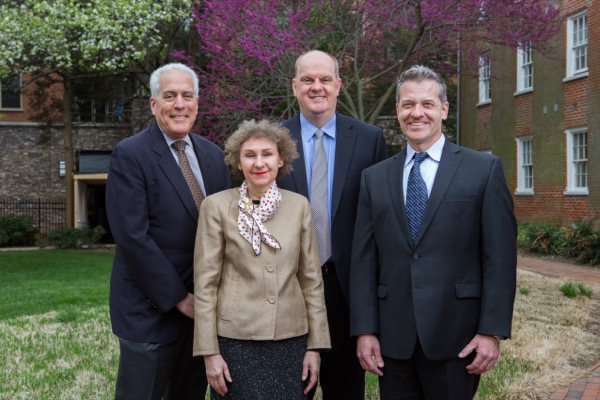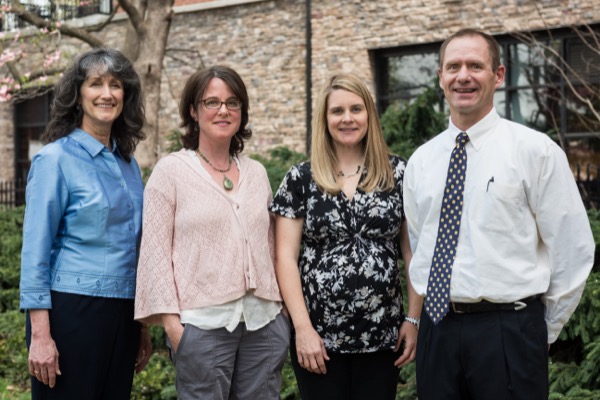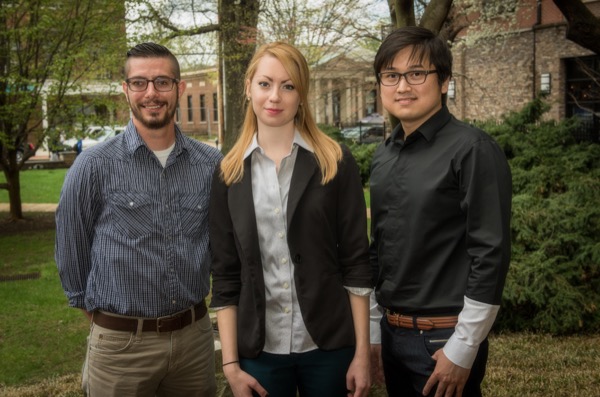


Faculty honors
Eight UD faculty members honored for teaching, advising
1:17 p.m., May 5, 2015--Eight members of the University of Delaware faculty have been recognized for noteworthy performance in teaching and advising, and three graduate students have received awards for excellence in teaching.
The Excellence in Teaching and Excellence in Academic Undergraduate Advising awards were presented at the May 4 meeting of the Faculty Senate.
Honors Stories
National Medal of Science
Warren Award
Based primarily on nominations from current and past students, faculty excellence awards recognize those professors whose courses are viewed as being thought-provoking, intellectually demanding, related to other fields and touching on contemporary issues and student experiences.
Awardees receive $5,000, have their portraits hung in the Morris Library for five years and have bricks inscribed with their names installed in Mentors’ Circle.
This year’s Excellence in Teaching Awards were presented to:
- Ralph Begleiter, Edward F. and Elizabeth Goodman Rosenberg Professor of Communication at UD and the founding director of the Center for Political Communication, in the College of Arts and Sciences;
- Guido Geerts, professor of accounting and management information systems and Ernst and Young Faculty Scholar, in the Alfred Lerner College of Business and Economics;
- Anthony Middlebrooks, associate professor in the Organizational and Community Leadership Program in the School of Public Policy and Administration, in the College of Arts and Sciences; and
- Margaret Stetz, Mae and Robert Carter Professor of Women’s and Gender Studies and professor of humanities, in the College of Arts and Sciences.
UD’s Excellence in Undergraduate Academic Advising Award is based on student nominations. Awardees receive $2,500 and also are honored with bricks inscribed in Mentors’ Circle.
This year’s honorees are:
- Laura Eisenman, associate professor in the School of Education and adviser for the interdisciplinary disabilities studies minor, in the College of Education and Human Development;
- Thomas Kaminski, professor of kinesiology and applied physiology, and director of undergraduate athletic training, in the College of Health Sciences;
- Deborah Delaney, assistant professor of entomology and wildlife ecology, in the College of Agriculture and Natural Resources; and
- Cynthia Diefenbeck, assistant professor in the School of Nursing in the College of Health Sciences.
Excellence in Graduate Student Teaching Awards
Each recipient of the graduate student Excellence in Teaching Award receives $1,500. This year’s honorees are:
- Jessica Conrad, doctoral student in the Department of English in the College of Arts and Sciences, and recipient of an Andrew W. Mellon Foundation Short-term Fellowship at the Library Company of Philadelphia;
- Kawin Thamtanajit, a doctoral student in the Department of Economics in the Alfred Lerner College of Business and Economics; and
- Zachary Voras, doctoral student in the Department of Chemistry and Biochemistry in the College of Arts and Sciences.
Award recipients shared their thoughts about teaching and advising with UDaily. Excerpts from their responses are printed below.
Excellence in Teaching
Ralph Begleiter: “My overarching teaching goal throughout my 16 years here has been to expose UD students to other cultural and political perspectives than the ones to which we’re all accustomed at home. I’ve discovered over the past decade and a half at UD that many of the students in my classes are eager to learn, enthusiastic about exposing themselves to topics they might not have discovered on their own, and feel strongly rewarded when they come away with new insights, different perspectives on themselves, their culture and our politics and media.”
Guido Geerts: “I am blessed with top-notch students who like to be challenged and are eager to learn. This makes teaching enjoyable and easy. Students come to class to learn, not to listen, so I encourage interaction with a focus on problem solving, while mixing a number of pedagogies so that students learn the same materials in different ways. As a teacher, my goals are to make sure students learn some core principles to the subject so they can apply these to a wide variety of problems in different contexts and to make sure that what they learn is relevant.”
Anthony Middlebrooks: “I believe a university education should be about expanding perspectives and inspiring future learning. Although each class has educational objectives, underlying those are my goals to help students develop the mental habits and capacities that will serve them well long after my class. I generally find my students open to new ideas and perspectives, highly involved and hopeful about the future. When given the right culture and tools — and a bit of a push — students will consistently surprise themselves.”
Margaret Stetz: “My goal is always to encourage students to see the interconnectedness of ideas and action and to develop critical thinking that will enable them to accomplish whatever goals they identify as worth pursuing. I live to hear students say, ‘I never thought about that before.’ Life does not divide neatly into disciplinary packages, and neither do the ideas and materials that I bring to the undergraduate classroom. Only by crossing intellectual divides can we both prepare students to understand the world that they will be entering and equip them to shape it in positive ways.”
Excellence in undergraduate advising
Laura Eisenman: “My primary goal, especially with the minor in disabilities studies, is to support students in finding opportunities to learn about disability from different perspectives in ways that advance their professional and personal goals. As an adviser, it involves being responsive in a timely way when students reach out, listening and sharing knowledge about resources in and outside of the University. I enjoy talking to students about their plans for the future and thinking with them about the possibilities ahead as well as opportunities in which they can get involved while at UD.”
Thomas Kaminski: “Our students, like most college-aged students, have many influences in their lives and therefore they have a tendency to change their line of reasoning and plans several times throughout their academic careers. Having the patience to understand that this is bound to happen enables me to be a good listener and support system as they try to navigate their careers away from UD. Advising for me never stops. I am in constant contact with our alumni, many of whom still call on me for professional and career advice regardless of how far removed they are from their UD undergraduate or graduate experience.”
Deborah Delaney: “Being an adviser is the most challenging part of my job at UD, and it requires me to get to know each of my students and understand how I can mentor them. Each student is so different and blessed with different gifts. Being a mentor also is the most rewarding part of my job, and watching a student grow and become more confident is the best. Being able to be a supportive and encouraging voice to the future generations in the field of entomology is an honor. Insects are just so cool!”
Cynthia Diefenbeck: “My most enjoyable connections are those students who participate actively in the advisement and mentoring process. I also enjoy students who bring unique life circumstances or challenges they are attempting to overcome. I have the utmost respect for students who are bettering themselves not just academically, but also personally. I know that I am doing my small part in helping make a difference not just for themselves, but for future generations.”
Excellence in graduate teaching
Kawin Thamtanajit: “Being friendly and easy-going is the approach I use to connect with my students, so none of them will be afraid to come for help and to ask questions during office hours. I would like to see my students develop economic intuition, because this is something that is very simple, but useful. It allows students to understand and be able to explain many economic activities or phenomena that are happening in their daily lives. If my students can develop even a tiny bit of intuition after taking my class, I would feel that I have done my job.”
Zachary Voras: “I consider my role as a teaching assistant to transfer the material learned in a textbook into a real world and laboratory environment application. I always hope that students, if nothing else, gain a sense of intuition toward experimental practices. As an analytical chemist, I find it is necessary to realize the parts of an experiment that require control and prudence toward safe and effective laboratory technique. If the students are able to detail and understand the important portions of an experiment, I consider my time successful.”
Jessica Conrad: “In my class, as in the academy, we often talk about how researching and reading scholarly articles is partaking in the conversation surrounding an issue, and it continues as students read, write, read further and rewrite. It’s not just cumulative knowledge that allows them to write intelligently, it’s the transformative understanding of an issue that allows students to make real sense of it, for themselves and for their audience. It’s the appreciation of learning as a recursive process that, I think, will empower students to be critical, conscientious citizen scholars.”
Article by Jerry Rhodes
Photographs by Ambre Alexander Payne, Evan Krape and Kathy F. Atkinson










